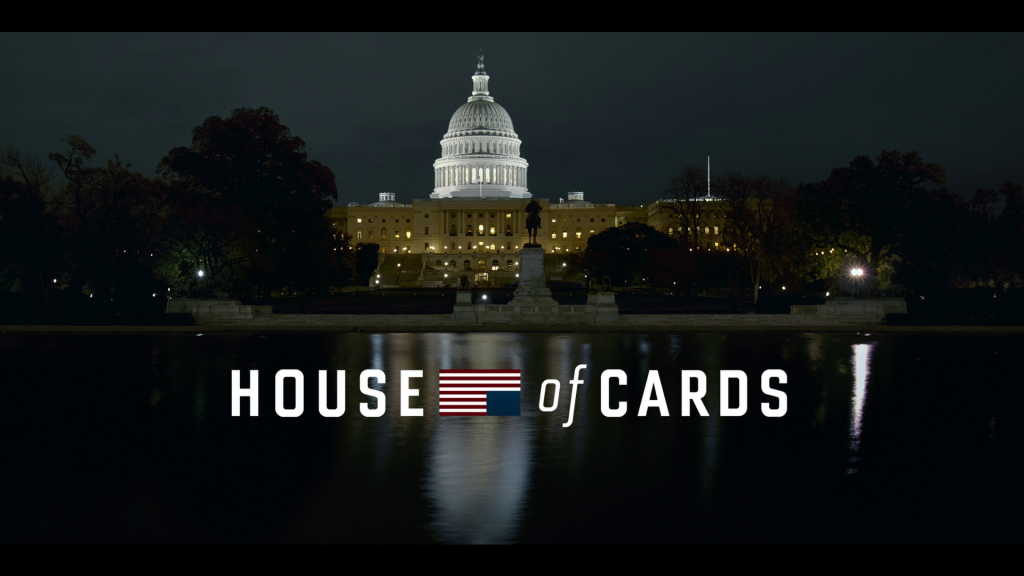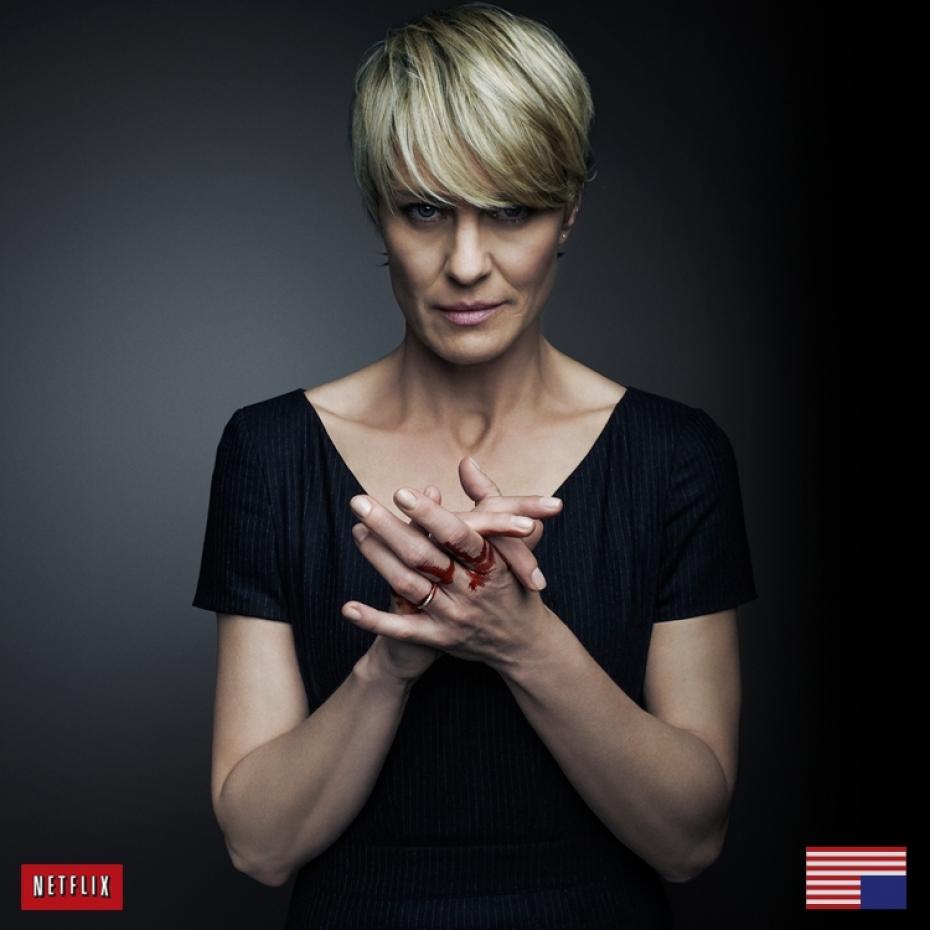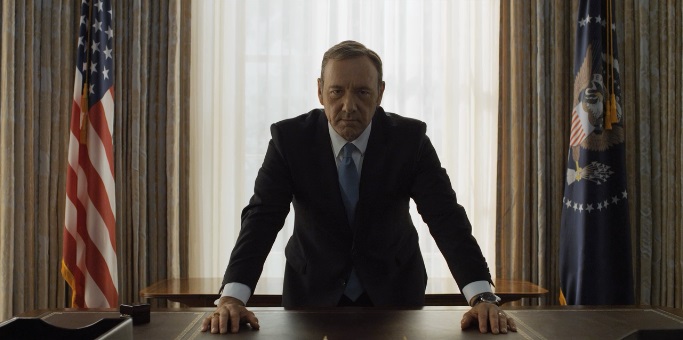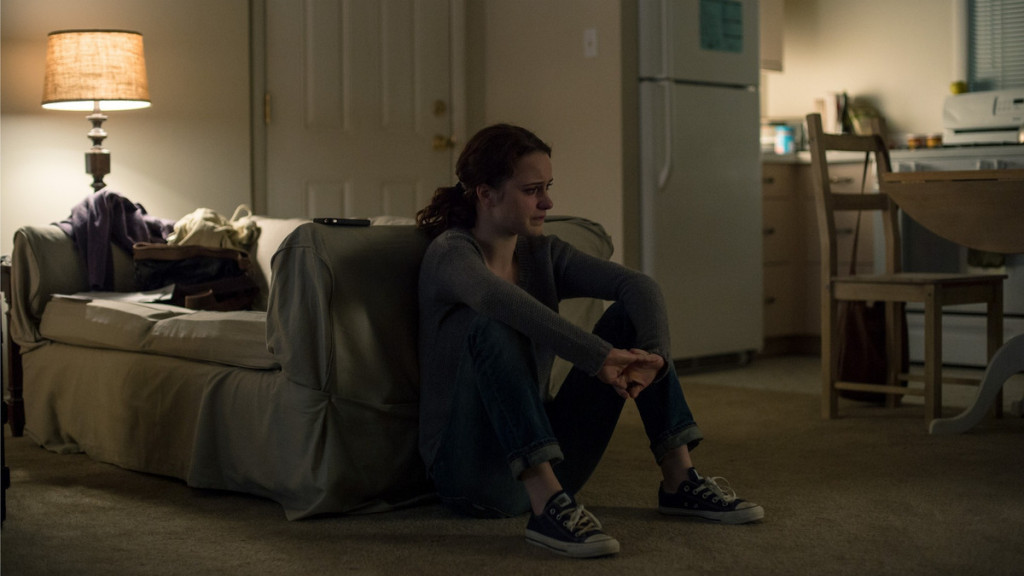House of Cards, the brilliant Netflix original series and intense political thriller, wowed critics and audiences with its debut last year. It was the first web-based series to win a Golden Globe for acting as well as myriad other wins and nominations for major entertainment awards. The critical acknowledgement it received, holding its own against the best of the best of network and cable television, meant that we had embarked on a new era of television viewing. Standards have been raised for what television and internet media should achieve and serialized programming is now optional.
(Spoilers For Seasons 1 & 2 Ahead)
Last season, we watched the rise of Kate Mara (24, American Horror Story) as Zoe Barnes, a young political journalist, and her attempt to navigate desire and ambition while under the thumb of endlessly-calculating, power-hungry Congressman and House Majority Whip (huh-wip) Frank Underwood. Underwood, played by Kevin Spacey, is a political mastermind who seeks a position of greater power and with the partnership of his equally calculating wife Claire (Robin Wright) and his vast repertoire of manipulation tactics, achieves just that. Claire and Frank’s buttoned-up marriage harkens back to the original purpose of matrimony; a political alliance, as they use each other’s connections to achieve greatness in their careers. Affairs are a tool for gain, the only betrayal is action that strays from their goals. However, there is real affection in their shared cigarettes, the quiet level of expectation as they look at each other, their endless scheming.
The dog incident in “Chapter One” immediately clues us in to Underwood’s merciless apathy and willingness to do whatever is necessary to advance his desires. However, in DC, where everyone is always watching, his murder and cover-up of an alcoholic politician protégé still causes us to recoil in horror at the depths of his dark ambition towards the end of the season. The stakes of House of Cards feel real and Frank Underwood’s cunning and ruthless mind is less of a labyrinth and more of a spiral staircase that leads to inevitable subterranean darkness.
The Valentine’s Day Season Two release meant big things. (1) My boyfriend felt a little neglected. (2) As his Vice Presidency begins, we now know that Frank Underwood’s lust for power could not be slaked for anything less than world domination.
The first episode of Season Two, titled “Chapter 14”, begins with Frank and Claire on the pre-dawn run they left Season One with, running side by side, aligned, the betrayals of last season dismissed. They are running towards an ultimate goal and their pursuit is determined and absolute throughout the season. It isn’t until the end of the episode that Frank turns back towards the camera, breaking the fourth wall to hold you in his chilling gaze, to let you know that he hasn’t forgotten you. His genius requires an audience.
The loose ends of Season One are quickly tied up in the first few episodes; characters are aggressively tossed aside. Jeanine, Zoe, and Lucas, meet their various ends at the hands of the political wheel (After Peter Russo’s death, if you thought that anyone would be safe from Underwood, you were wrong. In Zoe’s case, dead wrong.) Gillian’s story takes a surprisingly upbeat turn at the Clean Water Initiative. Christina Gallagher is now PA to the President and slips into the background as a pawn. The only exception is call girl Rachel Posner, who remains closeted away by Doug Stamper, and becomes a recurring thread in the story.
This makes way for the entry of power players into the political arena. Raymond Tusk, billionaire and close friend of the president becomes Underwood’s main obstacle, as he and corrupt Chinese official Xander Feng make and break secretive deals with the White House. Remy Danton becomes a major player of his own by aligning himself with Tusk (and major shirtless screentime, not complaining). Underwood’s replacement as House Whip, Jaqueline Sharp, is somewhat of a foil to Frank’s use of the role, refusing to bribe and manipulate and preferring to strong arm with integrity intact.
As Underwood’s right-hand man Doug Stamper wrestles his own demons and addictions past and present, he is joined by an ambitious press secretary seeking to rise along with the Underwood’s to power.
Claire drops the Clean Water Initiative quickly to assume her role as politician’s wife and turns an exposing interview into a chance to champion a bill to change the proceedings of military rape trials. She tactfully befriends the First Lady and pulls other women in as strong support.
Upon assuming the Vice Presidency, Underwood discovers a number of problems in the Walker administration. Garrett Walker is weak and easily manipulated by those around him, but displays occasional stubbornness. Those around him; Frank Underwood, Raymond Tusk, and Linda Vasquez, use this to their advantage against each other. Underwood successfully estranges Tusk and the President as friends, and pushes Linda to the side. Linda accepts defeat gracefully, which Frank respects, but Tusk and the White House administration spend the season firing shots down the battlefield. With Tusk out of the picture, Underwood becomes the President’s closest friend and biggest enemy.
Due to the involvement of Xander Feng, international relations erupt into a naval standoff and the US faces an energy crisis with a strong economic backlash. Frank turns this crisis into an opportunity to push the last remaining obstacle out of the way so that he can assume the seat of power.
The Oval Office. Would you expect anything less?
I’m still not clear whether Frank is more of a cunning strategist with plans set in motion, or if he is just a brilliant opportunist just waiting for other characters to buckle and begin to show their cracks. The season ends with Underwood assuming the Presidency. Claire allows him to walk into the Oval Office alone and he takes it with force.
The curious thing about Season Two is the evidence of humanity that it provides in light of Frank and Claire Underwood’s ruthless rise to power in the White House. In the first episode, Edward Meechum, Frank’s personal security detail, buys him a birthday present of monogrammed cuff links despite being advised not to try. Frank wears the cuff links at the end of the episode. It is easy to see that Meechum is unwaveringly devoted to the Underwood’s which becomes apparent as the three engage in a sexual tryst around episode 11. Likewise, Rachel Posner is kept around as an object of fascination for Doug Stamper, even as she seeks more of a life for herself through the discovery of church and human affection, even as she becomes Stamper’s downfall. Even Claire has moments of vulnerability; when she reveals her rape by a college boyfriend, and a moment of real tears in the finale as she reflects on those innocents who have been trampled to ensure the Underwood’s success. Frank’s reaction to the rape incident is one moment where his love for Claire is exposed and it is clear that their marriage is more than just an alliance for gain.
Season Two is a bulldozer. If you expected anything less, then you would have fallen into one of Underwood’s traps easily. Its conclusion is inevitable.
House of Cards has already been renewed for a third season, but I’m not sure how much higher Frank Underwood could possibly climb. Will he face the challenges of having to actually rule the country, or will he spend Season Three staving off the advances of a usurper?
Season Two is a strong follow-up to the award-winning first season of House of Cards. Whether you binge watch or ration the episodes, Season Two is worth a watch and a re-watch.
House of Cards is available exclusively on Netflix. Let me know your thoughts in the comments below.






2 thoughts on “House of Cards Season Two: Inevitability”
Comments are closed.